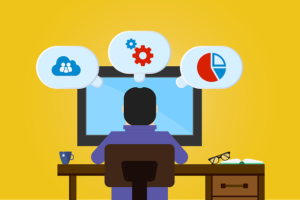Healthcare software development is undergoing a revolution, with advancements in technology providing new opportunities for improving patient care, streamlining operations, and delivering more affordable and accessible healthcare services. As the demand for innovative healthcare solutions continues to grow, developers are at the forefront of revolutionizing the industry through the creation of cutting-edge software applications. This article explores the latest trends and techniques in healthcare software development that are reshaping the future of healthcare delivery.
Table of Contents
- 1. Introduction to Revolutionizing Healthcare Software Development
- 2. Importance of Innovation in Healthcare Technology
- 3. Implementing Agile Methodologies in Healthcare Software Development
- 4. Leveraging Data Science and Artificial Intelligence in Healthcare Applications
- 5. Enhancing User Experience in Healthcare Software
- 6. Future Trends in Revolutionizing Healthcare Software Development
- Q&A
1. Introduction to Revolutionizing Healthcare Software Development
Revolutionizing healthcare software development involves the implementation of advanced technologies and practices to enhance the quality, efficiency, and effectiveness of healthcare systems. By leveraging cutting-edge software solutions, healthcare organizations can streamline their processes, improve patient outcomes, and optimize resource utilization. This introduction serves as a comprehensive overview of the key concepts, methodologies, and strategies that drive innovation in healthcare software development.
Throughout this section, we will delve into the latest trends and advancements in healthcare technology, explore the challenges and opportunities facing the industry, and discuss the impact of digital transformation on patient care. From artificial intelligence and machine learning to telemedicine and electronic health records, **innovative software** plays a crucial role in shaping the future of healthcare delivery. Join us on this journey as we explore the possibilities of revolutionizing healthcare through cutting-edge software development.

2. Importance of Innovation in Healthcare Technology
Innovation in healthcare technology plays a crucial role in improving patient outcomes, increasing efficiency, and transforming the delivery of care. By staying at the forefront of technological advancements, healthcare organizations can provide better and more personalized treatment options for patients. This leads to a higher quality of care and ultimately contributes to better overall health outcomes for individuals.
Additionally, innovation in healthcare technology can help reduce costs associated with medical treatments and procedures. By implementing new technologies such as electronic health records, telemedicine platforms, and wearable devices, healthcare providers can streamline processes, minimize errors, and enhance communication among care teams. This not only saves time and resources but also improves the overall patient experience and satisfaction.
3. Implementing Agile Methodologies in Healthcare Software Development
Agile methodologies can bring significant benefits to healthcare software development processes, enhancing efficiency and flexibility in project management. By breaking down the software development process into smaller, manageable increments, teams can adapt to changing requirements and deliver incremental value to stakeholders.
Key principles of include:
Iterative Development: Breaking down development tasks into smaller iterations to facilitate continuous improvement and feedback.Cross-Functional Teams: Encouraging collaboration between developers, testers, and healthcare professionals to ensure a comprehensive approach to software development.Embracing Change: Being open to evolving requirements and incorporating feedback from end-users to deliver a product that meets their needs.
4. Leveraging Data Science and Artificial Intelligence in Healthcare Applications
Data science and artificial intelligence (AI) are revolutionizing the healthcare industry by providing new methods for analyzing and interpreting vast amounts of data. With the advancements in technology, healthcare providers can now leverage these tools to improve patient outcomes, streamline operations, and enhance decision-making processes. By harnessing the power of data science and AI, healthcare organizations can unlock valuable insights from electronic health records, medical imaging data, and wearable devices.
These technologies enable healthcare professionals to develop predictive models for identifying at-risk patients, personalizing treatment plans, and optimizing resource allocation. Through the use of machine learning algorithms and natural language processing techniques, data science and AI systems can automate tasks, detect patterns, and generate actionable recommendations. By embracing these innovative technologies, healthcare applications can achieve higher levels of accuracy, efficiency, and effectiveness, ultimately leading to improved patient care and overall outcomes.
5. Enhancing User Experience in Healthcare Software
One key aspect of is through the implementation of a user-friendly interface. This includes designing intuitive navigation menus, clear labels, and easily accessible features to improve overall usability. Additionally, utilizing responsive design principles ensures that the software functions seamlessly across various devices, allowing healthcare professionals to access critical information efficiently.
Another way to enhance user experience is by incorporating personalized features that cater to individual user preferences. This can include customizable dashboards, personalized notification settings, and the ability to save frequently used templates or tools. By tailoring the software to the specific needs of each user, healthcare professionals can streamline workflows, increase productivity, and ultimately provide better patient care.
6. Future Trends in Revolutionizing Healthcare Software Development
One major trend that we are witnessing in the healthcare software development industry is the implementation of artificial intelligence (AI) and machine learning algorithms. These technologies are being used to analyze large amounts of patient data to identify patterns and provide insights that can help healthcare providers make more informed decisions. By leveraging AI and machine learning, healthcare software developers can create smarter and more efficient solutions that ultimately improve patient outcomes.
Another trend that is revolutionizing healthcare software development is the increasing focus on interoperability. With the growing number of healthcare applications and systems being used by different providers, it has become crucial for these systems to be able to communicate and share data seamlessly. By focusing on interoperability, healthcare software developers can ensure that different solutions can work together effectively, leading to better coordination of care and improved patient experiences.
Q&A
Q: What are some common challenges faced in healthcare software development?
A: Some common challenges include ensuring compliance with strict regulations, integrating with existing systems, and maintaining data security.
Q: How can Agile methodology benefit healthcare software development?
A: Agile methodology allows for continuous improvement and collaboration, leading to faster development cycles and more adaptive software solutions to meet evolving healthcare needs.
Q: What role does interoperability play in revolutionizing healthcare software development?
A: Interoperability ensures that different systems can communicate and share information, leading to improved efficiency, better patient care, and overall streamlined healthcare processes.
Q: How can data analytics and AI technologies enhance healthcare software development?
A: Data analytics and AI technologies can improve decision-making processes, personalize patient care, and automate routine tasks, ultimately leading to enhanced healthcare outcomes and efficiency.
Q: What are some key considerations when developing healthcare software for mobile devices?
A: Key considerations include ensuring data security, complying with regulations, designing user-friendly interfaces for both patients and healthcare professionals, and integrating with existing systems for seamless data exchange.
In conclusion, the potential for revolutionizing healthcare software development is vast. By incorporating cutting-edge technologies such as AI, machine learning, and blockchain, we can streamline processes, improve patient outcomes, and enhance overall efficiency within the healthcare industry. It is crucial for developers to stay abreast of the latest trends and advancements in order to truly revolutionize healthcare software development. With a dedicated focus on continuous innovation and collaboration, we can create a brighter, more efficient future for healthcare. Let us continue to push the boundaries of what is possible and redefine the standards of healthcare software development.




